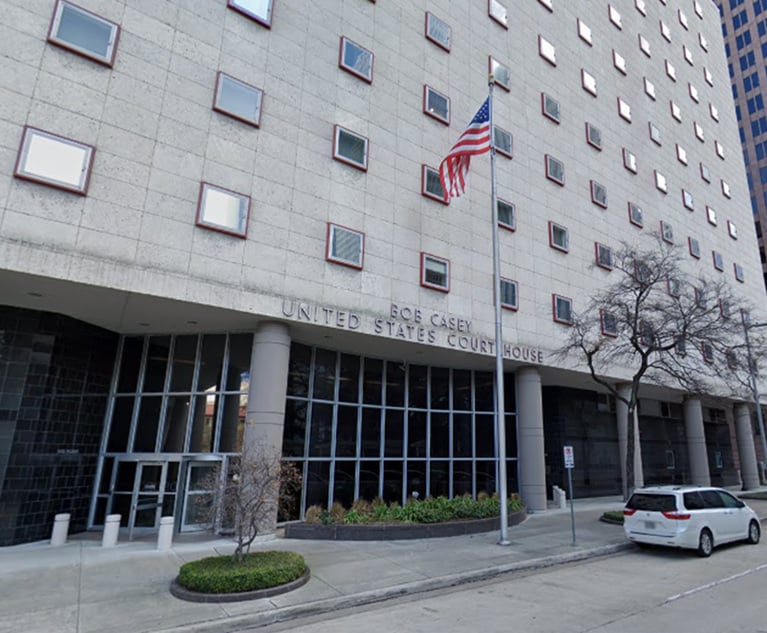Firms Halted Innovation Efforts in 2018 at Their Own Risk, Report Finds
A study by consulting firm Altman Weil found that while law firms had a stellar 2018, the good times brought complacency as long-term market forces continue to change the legal landscape.
May 15, 2019 at 04:24 PM
3 minute read

Law firms had a great 2018: Demand was up, as were top-line gross revenues, and partners were busy. But those successes have made law firms complacent about what could matter most in the long term, according to Altman Weil's annual Law Firms in Transition Survey.
Firms have stopped aggressively pushing for the increasingly cost-effective and valuable services clients are still demanding, according to survey co-author Eric Seeger. And down the road, firms that deescalate progress in legal operations could be in hot water in an increasingly competitive market.
“People are happy because times are good right now,” said Seeger. “But clients still want it better, faster and cheaper. So when the economy turns, as it always will, firms need to be in a position to demonstrate that they are focused on that and can deliver to clients' expectations.”
Altman surveyed 810 managing partners and chairs from 362 law firms for this study. Forty-six percent of the Am Law 200 participated.
On almost all fronts, 2018 was a stellar year for law firms, according to the study. The vast majority of law firms—78%—reported higher year-over-year gross revenues, up 10 percentage points over 2017. Additionally, 77% of firms reported higher revenue per lawyer and 72% of firms said profits per partner rose as well. Higher demand brought higher billing rates, with 61% of firms reporting “aggressive” rate growth in 2018.
“Lawyers are busier. Firms raised their rates more aggressively than in previous years and the clients paid the increases,” wrote Seeger and co-author Tom Clay.
But a good year does not fundamentally alter the economics of the legal market. Seeger and Clay found that firms have relaxed in their efforts to improve legal and work processes and lower costs. Regardless of a recession, Seeger said that firms must continue to differentiate themselves from the pack or risk losing out in the long term.
“It's still a highly competitive market. Clients are very aware that they have choices,” said Seeger. “We are advising firms to not get complacent but to focus on long-term stability and competitiveness.”
The study found that only 54% of law firm leaders say that their firm's urgency to change is higher now than it was two years ago. And only 22% of firms made a serious effort to change work processes.
The authors wrote that it is imperative that law firms continue to value change. Firms should take a look at their legal operations—pricing, staffing, technology utilization and knowledge management—to appease clients who want to see lower legal costs, they said. Leadership development and collaboration can help reduce a culture of feet-dragging.
“As has been the case for years, law firms' success will be driven by their ability to meet the changing requirements of the marketplace,” the authors wrote. “Firms that can craft smart, client-focused strategies and execute on them rapidly are likely to achieve competitive advantages.”
This content has been archived. It is available through our partners, LexisNexis® and Bloomberg Law.
To view this content, please continue to their sites.
Not a Lexis Subscriber?
Subscribe Now
Not a Bloomberg Law Subscriber?
Subscribe Now
NOT FOR REPRINT
© 2025 ALM Global, LLC, All Rights Reserved. Request academic re-use from www.copyright.com. All other uses, submit a request to [email protected]. For more information visit Asset & Logo Licensing.
You Might Like
View All
Law Firms Expand Scope of Immigration Expertise Amid Blitz of Trump Orders
6 minute read
Am Law 100 Lateral Partner Hiring Rose in 2024: Report

KPMG's Bid to Practice Law in U.S. on Indefinite Hold, as Arizona Justices Exercise Caution

JCPenney Seeks Return of More Than $1.1M From Jackson Walker For Bankruptcy Work
3 minute readTrending Stories
- 1Being a Profession is Not Malarkey
- 2Bring NJ's 'Pretrial Opportunity Program' into the Open
- 3High-Speed Crash With Police Vehicle Nets $1.6 Million Settlement
- 4Embracing a ‘Stronger Together’ Mentality: Collaboration Best Practices for Attorneys
- 5Selling Law. How to Get Hired, Paid and Rehired
Who Got The Work
J. Brugh Lower of Gibbons has entered an appearance for industrial equipment supplier Devco Corporation in a pending trademark infringement lawsuit. The suit, accusing the defendant of selling knock-off Graco products, was filed Dec. 18 in New Jersey District Court by Rivkin Radler on behalf of Graco Inc. and Graco Minnesota. The case, assigned to U.S. District Judge Zahid N. Quraishi, is 3:24-cv-11294, Graco Inc. et al v. Devco Corporation.
Who Got The Work
Rebecca Maller-Stein and Kent A. Yalowitz of Arnold & Porter Kaye Scholer have entered their appearances for Hanaco Venture Capital and its executives, Lior Prosor and David Frankel, in a pending securities lawsuit. The action, filed on Dec. 24 in New York Southern District Court by Zell, Aron & Co. on behalf of Goldeneye Advisors, accuses the defendants of negligently and fraudulently managing the plaintiff's $1 million investment. The case, assigned to U.S. District Judge Vernon S. Broderick, is 1:24-cv-09918, Goldeneye Advisors, LLC v. Hanaco Venture Capital, Ltd. et al.
Who Got The Work
Attorneys from A&O Shearman has stepped in as defense counsel for Toronto-Dominion Bank and other defendants in a pending securities class action. The suit, filed Dec. 11 in New York Southern District Court by Bleichmar Fonti & Auld, accuses the defendants of concealing the bank's 'pervasive' deficiencies in regards to its compliance with the Bank Secrecy Act and the quality of its anti-money laundering controls. The case, assigned to U.S. District Judge Arun Subramanian, is 1:24-cv-09445, Gonzalez v. The Toronto-Dominion Bank et al.
Who Got The Work
Crown Castle International, a Pennsylvania company providing shared communications infrastructure, has turned to Luke D. Wolf of Gordon Rees Scully Mansukhani to fend off a pending breach-of-contract lawsuit. The court action, filed Nov. 25 in Michigan Eastern District Court by Hooper Hathaway PC on behalf of The Town Residences LLC, accuses Crown Castle of failing to transfer approximately $30,000 in utility payments from T-Mobile in breach of a roof-top lease and assignment agreement. The case, assigned to U.S. District Judge Susan K. Declercq, is 2:24-cv-13131, The Town Residences LLC v. T-Mobile US, Inc. et al.
Who Got The Work
Wilfred P. Coronato and Daniel M. Schwartz of McCarter & English have stepped in as defense counsel to Electrolux Home Products Inc. in a pending product liability lawsuit. The court action, filed Nov. 26 in New York Eastern District Court by Poulos Lopiccolo PC and Nagel Rice LLP on behalf of David Stern, alleges that the defendant's refrigerators’ drawers and shelving repeatedly break and fall apart within months after purchase. The case, assigned to U.S. District Judge Joan M. Azrack, is 2:24-cv-08204, Stern v. Electrolux Home Products, Inc.
Featured Firms
Law Offices of Gary Martin Hays & Associates, P.C.
(470) 294-1674
Law Offices of Mark E. Salomone
(857) 444-6468
Smith & Hassler
(713) 739-1250










